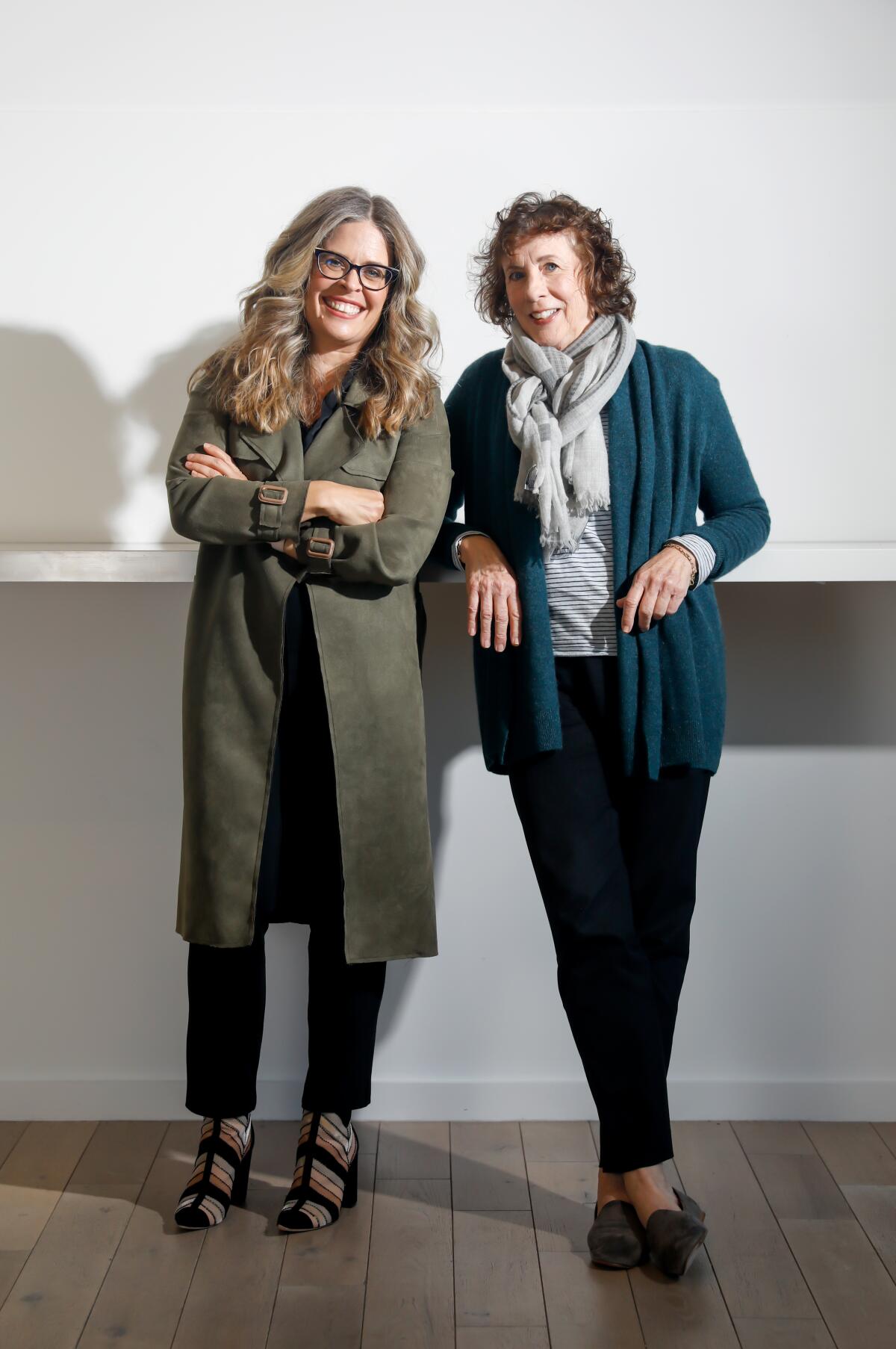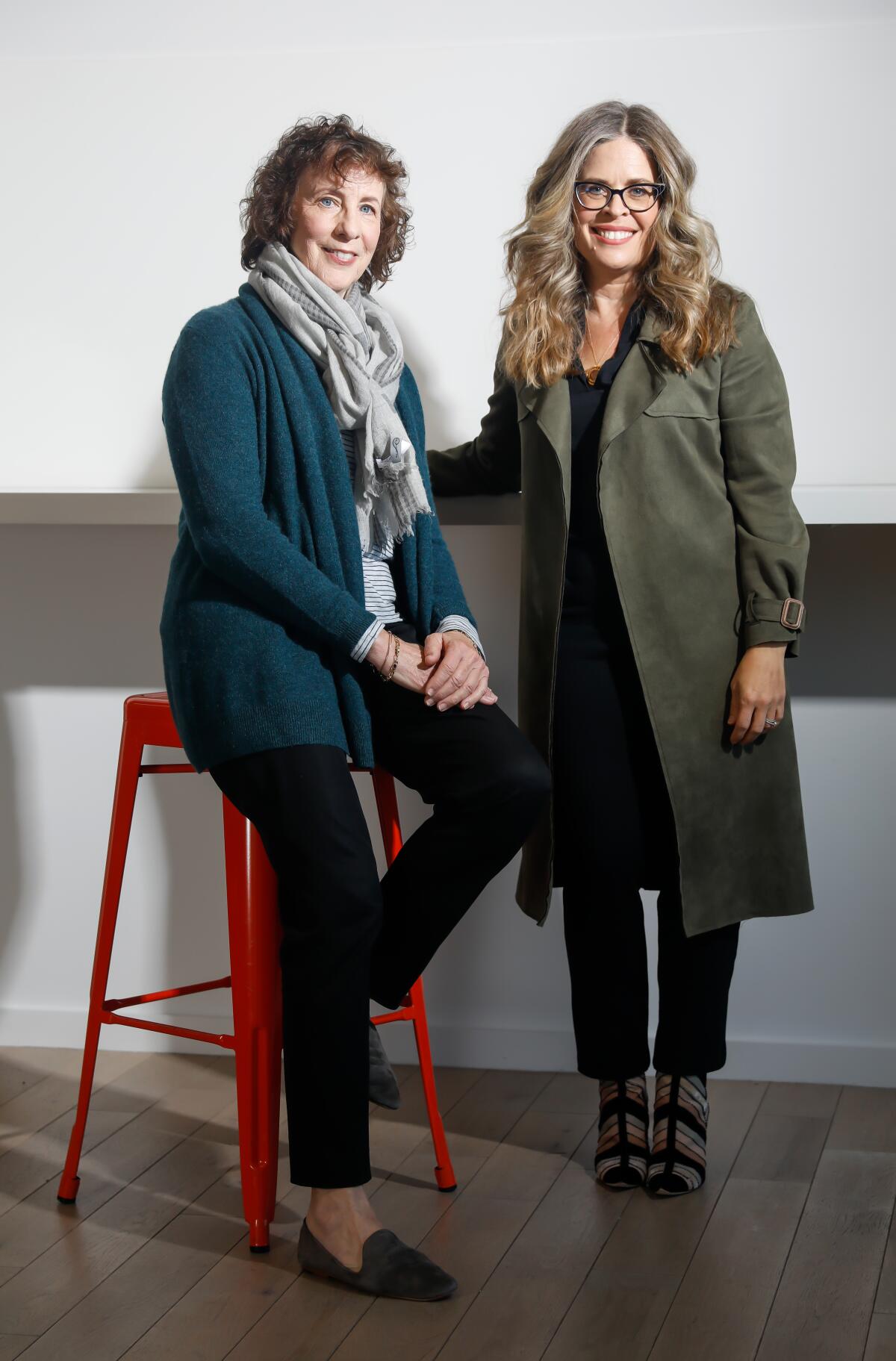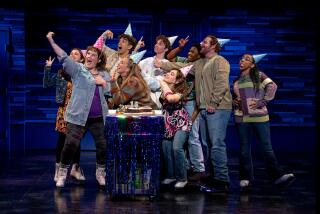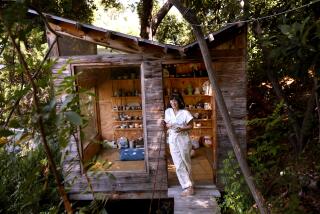‘Frozen’ and ‘Lion King’ are two of Disney’s biggest success stories. These women made it so

Jennifer Lee and Irene Mecchi are part of an extremely rarefied club. They were integral to the success of Walt Disney Animation Studios’ three top-grossing films of all time: “Frozen,” “Frozen II” and “The Lion King,” which have cumulatively earned more than $3.8 billion globally.
Lee wrote and co-directed the first two, and Mecchi co-wrote the latter. Both women wrote the librettos for the stage adaptations of their respective films too. All of which is remarkable not just for the stunning success of the franchises they helped cultivate, but also because they are women in industries (both theater and film) that have notorious histories of being unwelcoming to women. The two remain committed to giving other women in the field advice and helping them get a foot in the door.
On a recent weekday afternoon, Lee and Mecchi sat together in the Disney lot’s Animation building in Burbank to celebrate a unique moment: the fact that their stage shows are running simultaneously in Southern California — “The Lion King” at the Pantages, through March 26, and “Frozen” at the Segerstrom Center for the Arts, which runs through Feb. 19.
The women had met only one other time — when “Frozen” opened on Broadway in 2018 (“A very intimate evening of 1,200 people,” Mecchi quipped). But they laugh and joke — and relate — as if they’ve been friends for life. It’s the kind of bond that only shared experience, and creating world-dominating art, can cultivate.
“Frozen” co-creator Jennifer Lee and her boyfriend, Alfred Molina, sit toward the front of the historic St.
Mecchi recalls feeling supported when she joined the creative team for “The Lion King” in 1992. Brenda Chapman was the head of story — the first woman to serve in that role on an animated feature film. (In 1998, Chapman became the first woman to direct an animated feature for a major studio with DreamWorks Animation’s “The Prince of Egypt.”) And Lorna Cook (“The Land Before Time,” “Mulan,” “Beauty and the Beast”) was key story artist. Linda Woolverton served as one of Mecchi’s co-writers, and had made history a year earlier as the first woman to write an animated feature for Disney with “Beauty and the Beast.” (She went on to write the book for that musical as well.)
“We were with a group of men who heard women,” Mecchi says of “The Lion King,” which was directed by Roger Allers and Rob Minkoff. “And I think that was one of the keys to [the film]. From the beginning it was very, ‘Yes, and?’ There was never a ‘No, this is a terrible idea.’”
Lee, too, remembers a receptive room of creatives when she was working on “Frozen.” At the time she was new to Disney, having just co-written the screenplay for “Wreck-It Ralph,” and she says she was “desperate for the job.”
Lee says she was hired after she saw an early screening of a draft of “Frozen” and voiced some concerns about character: “I don’t understand — these women are sisters, but they’re jealous? Why? Why is Anna so persnickety? Why does she demand butter-colored flowers instead of the yellow? They’re not likable. I don’t relate. And I’ve seen this before,” Lee recalls saying at a meeting afterward.
That was all it took for co-director Chris Buck and songwriters Robert Lopez and Kristen Anderson-Lopez to want Lee on board. From there, says Lee, the team dove into the ways women can feel misunderstood, the power that love and fear hold, and how fear can often take over, as well as “how much we mess up in love all the time.”
When “Frozen” was released in 2013, Lee became the first female director of a Disney Animation Studios film, and the first female director of a feature film that crossed the $1-billion mark at the box office. Today she is Disney Animation Studios’ chief creative officer. To say her rise through the ranks at the storied studio was supersonic would be an understatement.
Lee still remembers the day a decade ago when “Frozen” had just been released and she attended a showing with a friend in New York City around Christmastime. There was a promotional Olaf statue in the lobby that was dressed in a hula skirt, and it was wrecked.
“Someone stole his ukulele, and his skirt was gone, and he had no arms. He was just standing there in the corner broken,” Lee laughs, adding that she felt it didn’t necessarily bode well for the success of the film. But when she sat in the audience, she realized everyone was not only singing along, but they were also actually reciting the lines.
“It was after that I think people really started paying attention,” she says. “It was like, ‘This isn’t going away. It’s getting bigger.’”
Mecchi says she had a similar moment of realization about the scope of what she had helped to create with “The Lion King” the first time she saw the opening sequence cut together as a trailer. It was undeniably moving.
The film’s success was all the more exciting, Mecchi says, because at the time Disney had what she called “an A-B” system, “where they were going to do one big movie, and a small one. And ‘Lion King’ was going to be the smaller one.”
Mecchi remembers then-Walt Disney Studios Chairman Jeffrey Katzenberg remarking, “If this makes $45 million in its life, we’ll be happy.”
The anecdote makes Lee laugh.
“I won’t tell you what the diapers still make!” she says.

Despite the myriad ways “Frozen” and “The Lion King” have impacted pop culture and informed the childhoods (and parenthoods) of millions of people, Lee and Mecchi both hold a soft spot in their hearts for the stage musicals. To them, musicals represent an intimacy and an immediacy that can’t be achieved through film.
“The Lion King” opened on Broadway in 1997 and won six Tony Awards, including best musical and best direction of a musical for Julie Taymor — who became the first woman to nab the honor. (Mecchi was nominated for a Tony, for best book of a musical.) “The Lion King” has gone on to become the third-longest-running show in Broadway history, and the highest-grossing, having crossed the $10-billion mark worldwide.
The COVID-19 crisis forced the “Frozen” musical to close in March 2020. It had cost $35 million to mount and grossed more than $150 million, making it one of the biggest hits of the season. But pandemic pressures made it untenable to keep on Broadway alongside “Aladdin” and “The Lion King.”
Lee says she still gets the stage manager reports from every single show, and though she doesn’t necessarily read them, she can’t bring herself to filter them.
“Every now and then I just go, ‘Oh, what happened in Australia today?’” she says.
Lee loves seeing the names of the current stage managers because she recognizes them from the Broadway production — and many of them weren’t stage managers then. She says she feels so proud of them for progressing in their careers.
That’s what she hopes to keep doing for women, she says — opening doors so they can step in.
“For many women I speak to in the industry, access is the issue,” Lee says, adding that she’s working on building an environment at Disney Animation “with more creative leaders being women — and not just women, but people of color. The more they’re in the room, the more they support each other, and our rooms are stronger.”
Lee’s advice for women striving to succeed in male-dominated fields?
“It’s the work, it’s the discovery, it’s being willing to fail, but also a willingness to listen to criticism, and to let go of what hurts,” she says. “It’s really hard in a world where you feel like you have to do more just to be considered average. But it’s the best thing you can do.”
Mecchi nods in agreement, adding a bit of wisdom that could have been culled from a Disney script. As dark and dreary as things may sometimes seem, she says, “Keep an open mind, and an optimistic heart.”
‘Frozen’
Where: Segerstrom Center for the Arts, 600 Town Center Drive, Costa Mesa
When: 7:30 p.m. Tuesdays through Fridays; 2 and 7:30 p.m. Saturdays; 1 and 6:30 p.m. Sundays, through Feb. 19
Cost: Starting at $29
Contact: scfta.org
Running time: 2 hours, 15 minutes with intermission
‘The Lion King’
Where: Hollywood Pantages Theatre, 6233 Hollywood Blvd., L.A.
When: 7:30 p.m. Tuesdays and Wednesdays; 8 p.m. Thursdays and Fridays; 2 and 8 p.m. Saturdays; 1 and 6:30 p.m. Sundays
Cost: Starting at $33. Best availability: weeknights in March
Contact: broadwayinhollywood.com
Running time: 2 hours, 30 minutes with intermission
More to Read
The biggest entertainment stories
Get our big stories about Hollywood, film, television, music, arts, culture and more right in your inbox as soon as they publish.
You may occasionally receive promotional content from the Los Angeles Times.











